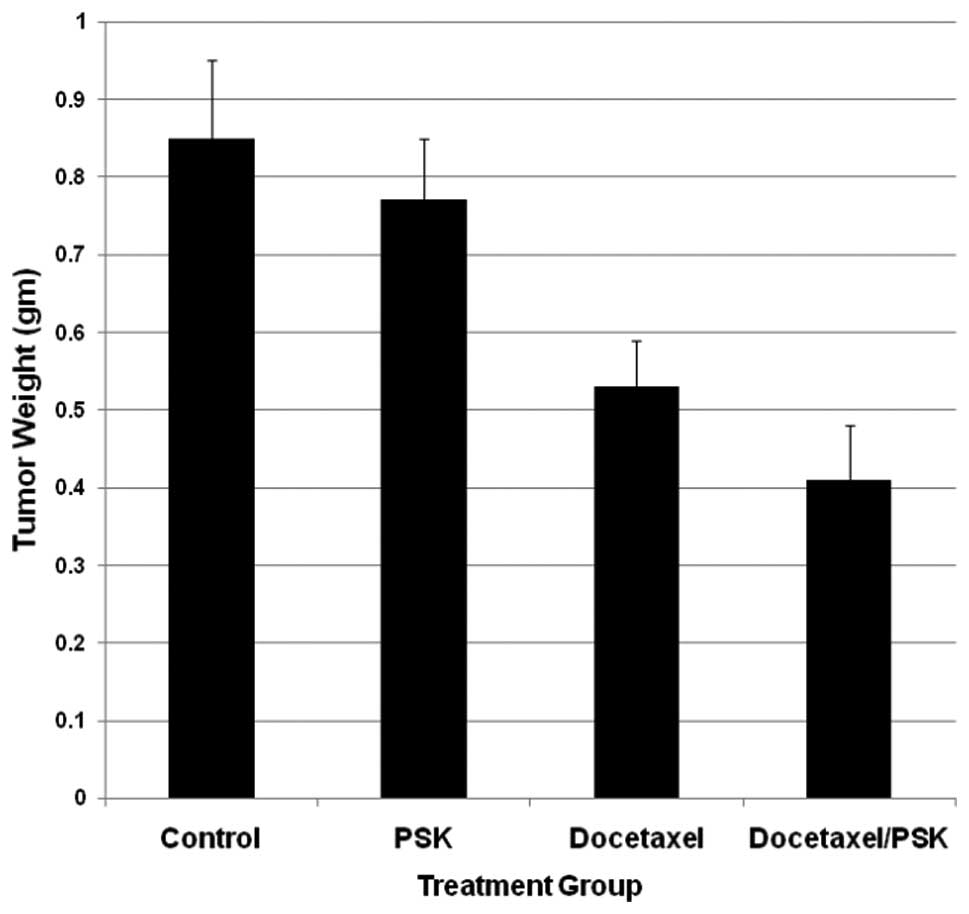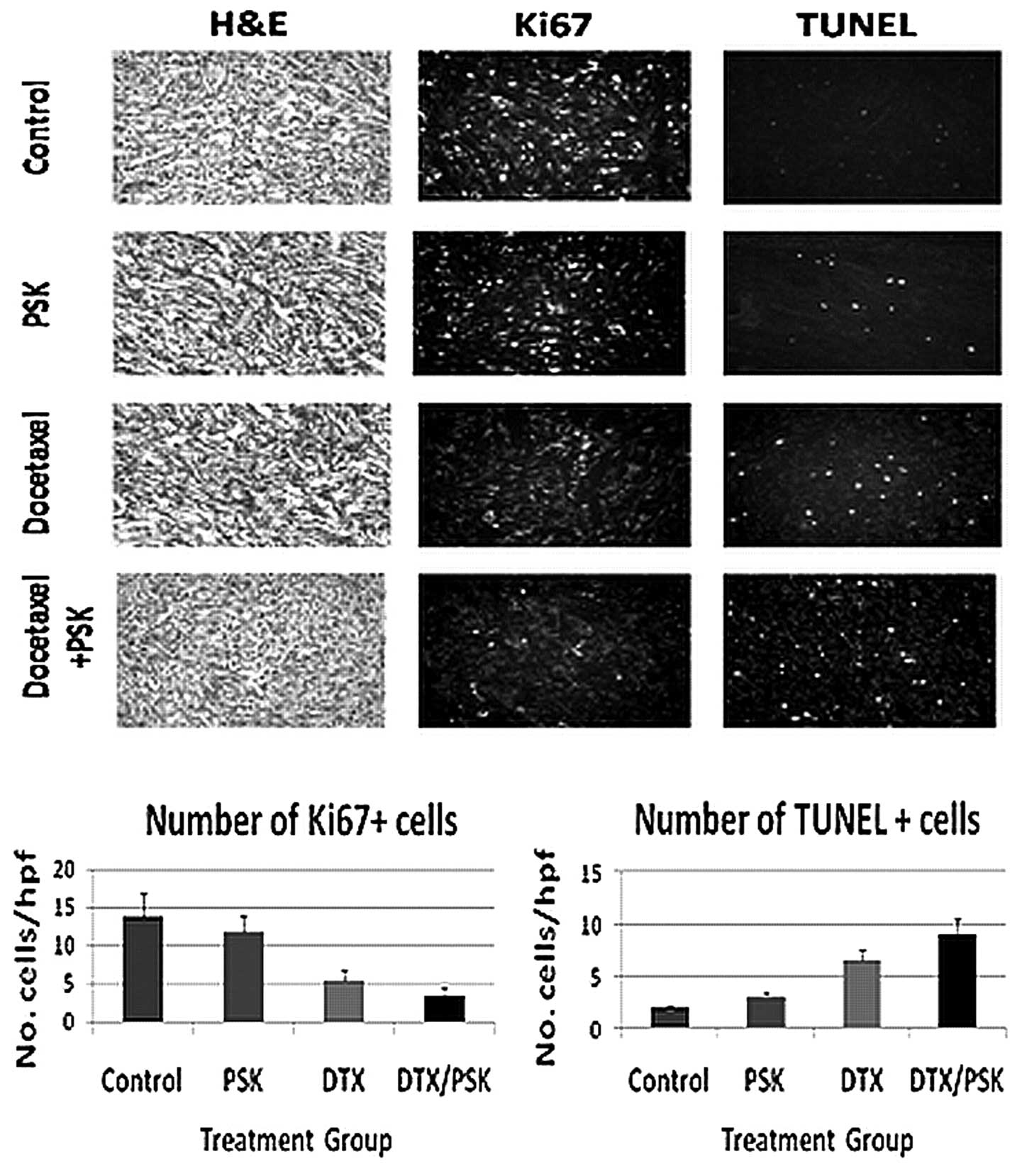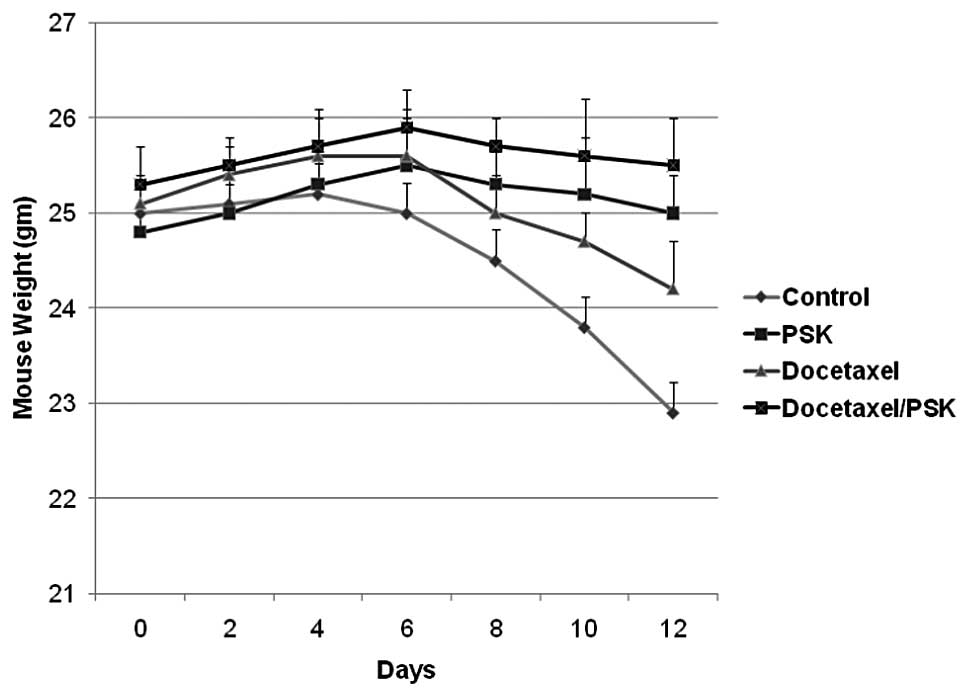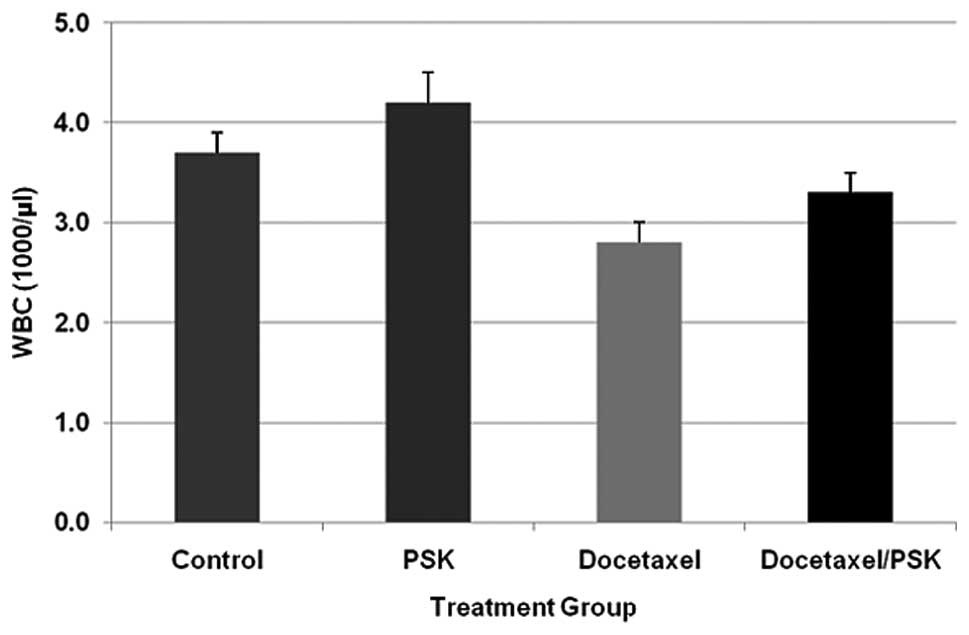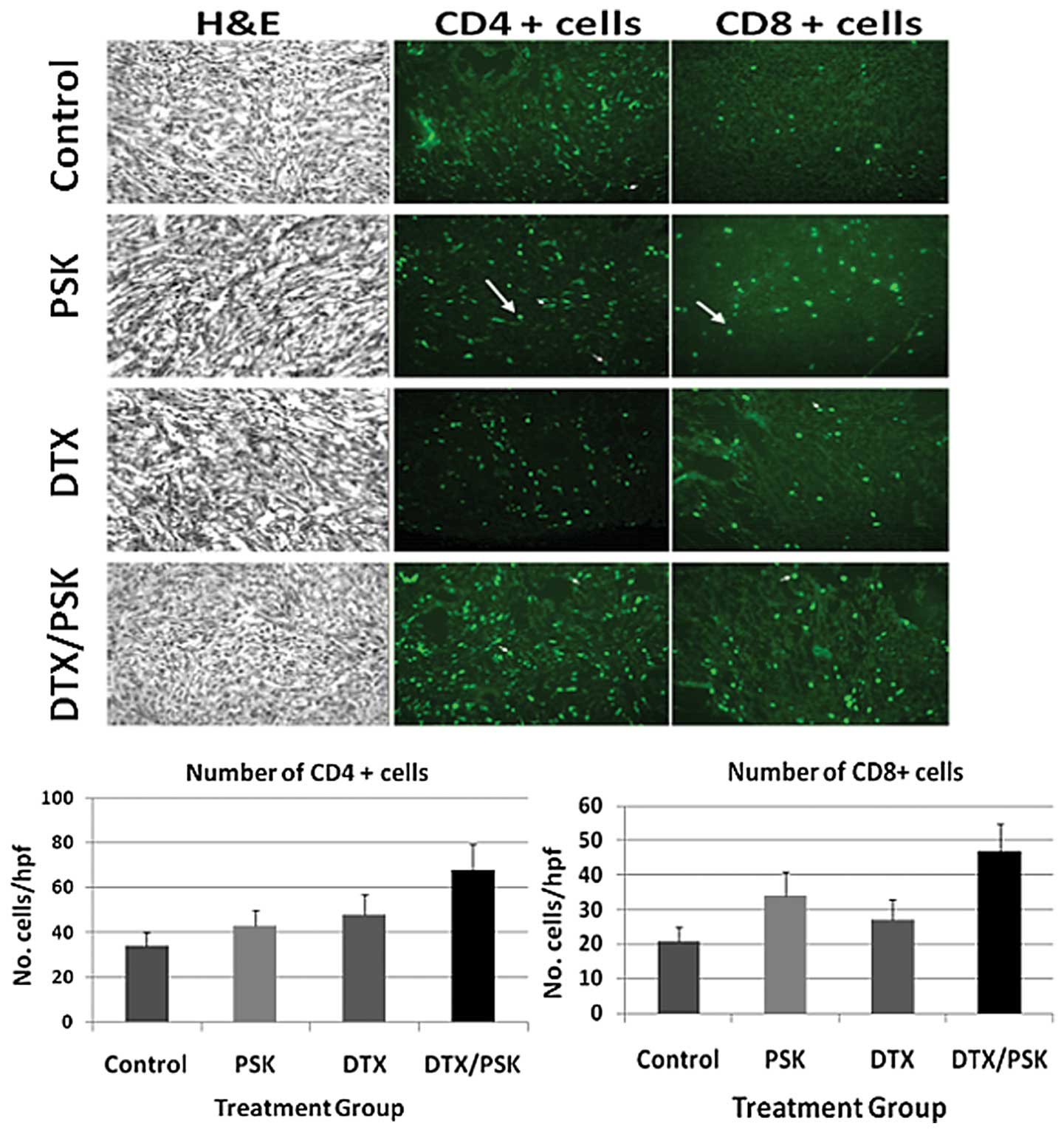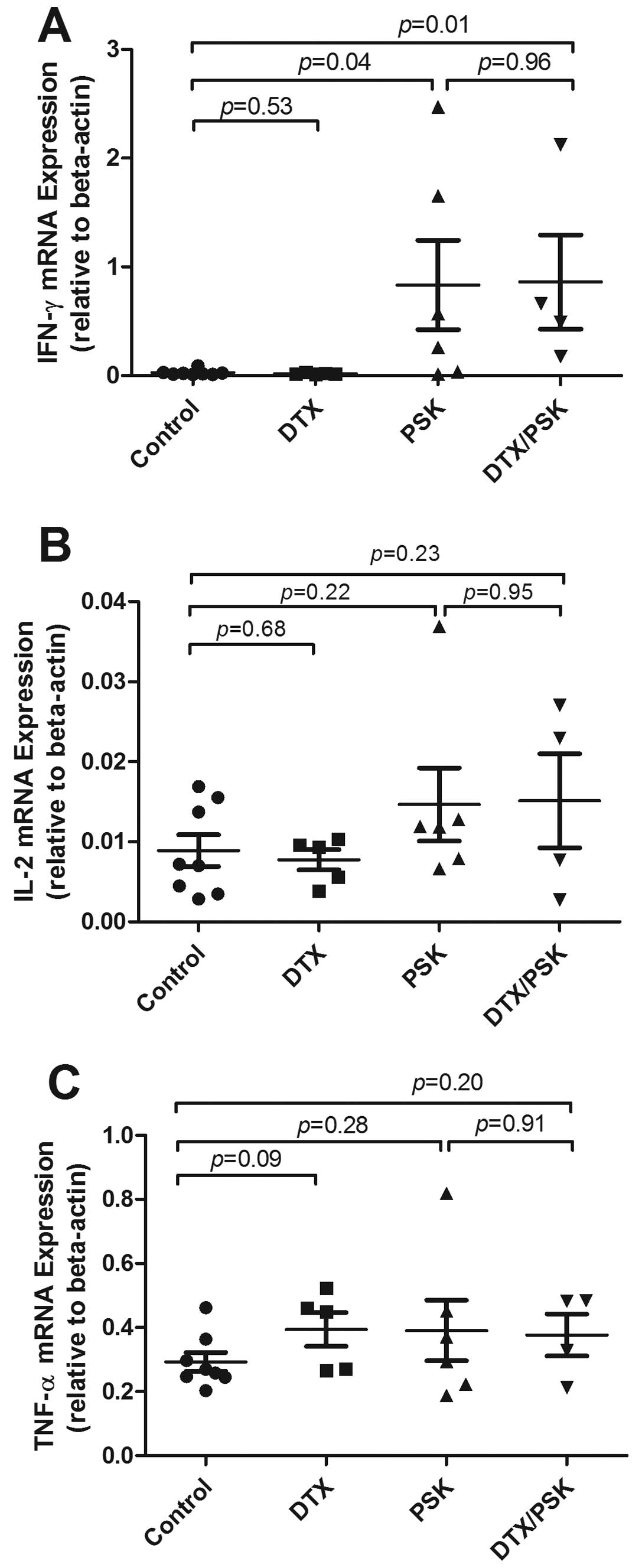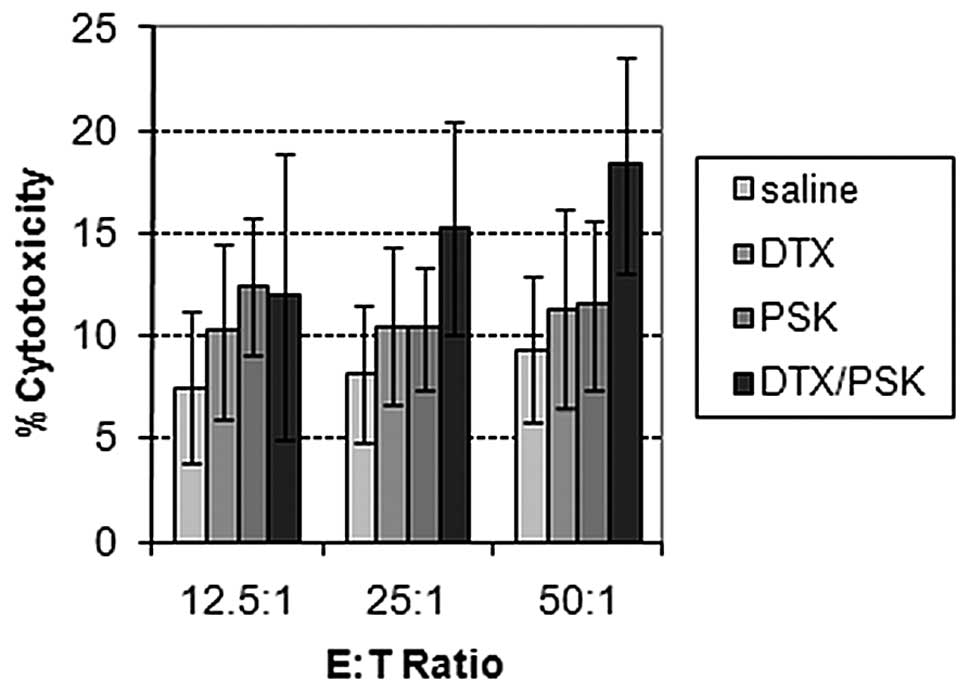|
1
|
Ferlay J, Shin HR, Bray F, Forman D,
Mathers C and Parkin DM: Estimates of worldwide burden of cancer in
2008: GLOBOCAN 2008. Int J Cancer. 127:2893–2917. 2010. View Article : Google Scholar : PubMed/NCBI
|
|
2
|
Lassi K and Dawson NA: Update on
castrate-resistant prostate cancer: 2010. Curr Opin Oncol.
22:263–267. 2010. View Article : Google Scholar : PubMed/NCBI
|
|
3
|
Petrylak DP, Tangen CM, Hussain MH, et al:
Docetaxel and estramustine compared with mitoxantrone and
prednisone for advanced refractory prostate cancer. N Engl J Med.
351:1513–1520. 2004. View Article : Google Scholar : PubMed/NCBI
|
|
4
|
Tannock IF, De Wit R, Berry WR, et al:
Docetaxel plus prednisone or mitoxantrone plus prednisone for
advanced prostate cancer. N Engl J Med. 351:1502–1512. 2004.
View Article : Google Scholar : PubMed/NCBI
|
|
5
|
Gueritte-Voegelein F, Guenard D, Lavelle
F, Le Goff MT, Mangatal L and Potier P: Relationships between the
structure of taxol analogues and their antimitotic activity. J Med
Chem. 34:992–998. 1991. View Article : Google Scholar : PubMed/NCBI
|
|
6
|
Bissery MC, Guenard D, Gueritte-Voegelein
F and Lavelle F: Experimental antitumor activity of taxotere (RP
56976, NSC 628503), a taxol analogue. Cancer Res. 51:4845–4852.
1991.PubMed/NCBI
|
|
7
|
Mike S, Harrison C, Coles B, Staffurth J,
Wilt TJ and Mason MD: Chemotherapy for hormone-refractory prostate
cancer. Cochrane Database Syst Rev. CD005247.2006.PubMed/NCBI
|
|
8
|
Quartino AL, Friberg LE and Karlsson MO: A
simultaneous analysis of the time-course of leukocytes and
neutrophils following docetaxel administration using a
semi-mechanistic myelosuppression model. Invest New Drugs. Dec
14–2010.(E-pub ahead of print).
|
|
9
|
Kantoff PW, Higano CS, Shore ND, et al:
Sipuleucel-T immunotherapy for castration-resistant prostate
cancer. N Engl J Med. 363:411–422. 2010. View Article : Google Scholar : PubMed/NCBI
|
|
10
|
Rozkova D, Tiserova H, Fucikova J, et al:
FOCUS on FOCIS: combined chemo-immunotherapy for the treatment of
hormone-refractory metastatic prostate cancer. Clin Immunol.
131:1–10. 2009. View Article : Google Scholar : PubMed/NCBI
|
|
11
|
Fong L, Kwek SS, O'Brien S, et al:
Potentiating endogenous antitumor immunity to prostate cancer
through combination immunotherapy with CTLA4 blockade and GM-CSF.
Cancer Res. 69:609–615. 2009. View Article : Google Scholar : PubMed/NCBI
|
|
12
|
Hodi FS, O'Day SJ, McDermott DF, et al:
Improved survival with ipilimumab in patients with metastatic
melanoma. N Engl J Med. 363:711–723. 2010. View Article : Google Scholar
|
|
13
|
Small EJ, Tchekmedyian NS, Rini BI, Fong
L, Lowy I and Allison JP: A pilot trial of CTLA-4 blockade with
human anti-CTLA-4 in patients with hormone-refractory prostate
cancer. Clin Cancer Res. 13:1810–1815. 2007. View Article : Google Scholar : PubMed/NCBI
|
|
14
|
Bristol-Myers Squibb. Phase 3 Study of
Immunotherapy to Treat Advanced Prostate Cancer. ClinicalTrialgov
[Internet] Bethesda (MD): National Library of Medicine (US); 2000,
[cited 20110824]. Available from: http://clinicaltrials.gov/ct2/show/NCT01057810.
NCT01057810.
|
|
15
|
Bristol-Myers Squibb. Study of
Immunotherapy to Treat Advanced Prostate Cancer. ClinicalTrialsgov
[Internet] Bethesda (MD): National Library of Medicine (US); 2000,
[cited 20110824]. Available from: http://clinicaltrials.gov/ct2/show/NCT00861614.
NCT00861614.
|
|
16
|
Kobayashi H, Matsunaga K and Oguchi Y:
Antimetastatic effects of PSK (Krestin), a protein-bound
polysaccharide obtained from basidiomycetes: an overview. Cancer
Epidemiol Biomarkers Prev. 4:275–281. 1995.PubMed/NCBI
|
|
17
|
Lu H, Yang Y, Gad E, et al: Polysaccharide
krestin is a novel TLR2 agonist that mediates inhibition of tumor
growth via stimulation of CD8 T cells and NK cells. Clin Cancer
Res. 17:67–76. 2011. View Article : Google Scholar : PubMed/NCBI
|
|
18
|
Mickey DD, Bencuya PS and Foulkes K:
Effects of the immunomodulator PSK on growth of human prostate
adenocarcinoma in immunodeficient mice. Int J Immunopharmacol.
11:829–838. 1989. View Article : Google Scholar : PubMed/NCBI
|
|
19
|
Hayakawa K, Mitsuhashi N, Saito Y, et al:
Effect of Krestin as adjuvant treatment following radical
radiotherapy in non-small cell lung cancer patients. Cancer Detect
Prev. 21:71–77. 1997.PubMed/NCBI
|
|
20
|
Hayakawa K, Mitsuhashi N, Saito Y, et al:
Effect of krestin (PSK) as adjuvant treatment on the prognosis
after radical radiotherapy in patients with non-small cell lung
cancer. Anticancer Res. 13:1815–1820. 1993.PubMed/NCBI
|
|
21
|
Iino Y, Yokoe T, Maemura M, et al:
Immunochemotherapies versus chemotherapy as adjuvant treatment
after curative resection of operable breast cancer. Anticancer Res.
15:2907–2911. 1995.PubMed/NCBI
|
|
22
|
Oba K, Teramukai S, Kobayashi M, Matsui T,
Kodera Y and Sakamoto J: Efficacy of adjuvant immunochemotherapy
with polysaccharide K for patients with curative resections of
gastric cancer. Cancer Immunol Immunother. 56:905–911. 2007.
View Article : Google Scholar : PubMed/NCBI
|
|
23
|
Nakazato H, Koike A, Saji S, Ogawa N and
Sakamoto J: Efficacy of immunochemotherapy as adjuvant treatment
after curative resection of gastric cancer. Study Group of
Immunochemotherapy with PSK for Gastric Cancer. Lancet.
343:1122–1126. 1994. View Article : Google Scholar : PubMed/NCBI
|
|
24
|
Sakamoto J, Morita S, Oba K, et al:
Efficacy of adjuvant immunochemotherapy with polysaccharide K for
patients with curatively resected colorectal cancer: a
meta-analysis of centrally randomized controlled clinical trials.
Cancer Immunol Immunother. 55:404–411. 2006. View Article : Google Scholar
|
|
25
|
Zhang H, Morisaki T, Nakahara C, et al:
PSK-mediated NF-kappaB inhibition augments docetaxel-induced
apoptosis in human pancreatic cancer cells NOR-P1. Oncogene.
22:2088–2096. 2003. View Article : Google Scholar : PubMed/NCBI
|
|
26
|
Kinoshita J, Fushida S, Harada S, et al:
PSK enhances the efficacy of docetaxel in human gastric cancer
cells through inhibition of nuclear factor-kappaB activation and
survivin expression. Int J Oncol. 36:593–600. 2010. View Article : Google Scholar : PubMed/NCBI
|
|
27
|
Yamasaki A, Shoda M, Iijima H, et al: A
protein-bound polysaccharide, PSK, enhances tumor suppression
induced by docetaxel in a gastric cancer xenograft model.
Anticancer Res. 29:843–850. 2009.PubMed/NCBI
|
|
28
|
Vremec D and Shortman K: Dendritic cell
subtypes in mouse lymphoid organs: cross-correlation of surface
markers, changes with incubation, and differences among thymus,
spleen, and lymph nodes. J Immunol. 159:565–573. 1997.
|
|
29
|
Katoh R, Takenoshita S, Shimizu Y, Tanaka
S, Yajima Y and Nagamachi Y: Effects on host of modified PVP
therapy combined with biological response modifiers in lung cancer.
Oncol Rep. 5:103–107. 1998.PubMed/NCBI
|
|
30
|
Castelo-Branco P, Passer BJ, Buhrman JS,
et al: Oncolytic herpes simplex virus armed with xenogeneic
homologue of prostatic acid phosphatase enhances antitumor efficacy
in prostate cancer. Gene Ther. 17:805–810. 2010. View Article : Google Scholar
|
|
31
|
Dzojic H, Loskog A, Totterman TH and
Essand M: Adenovirus-mediated CD40 ligand therapy induces tumor
cell apoptosis and systemic immunity in the TRAMP-C2 mouse prostate
cancer model. Prostate. 66:831–838. 2006. View Article : Google Scholar : PubMed/NCBI
|
|
32
|
Reddy KR, Guan Y, Qin G, Zhou Z and Jing
N: Combined treatment targeting HIF-1alpha and Stat3 is a potent
strategy for prostate cancer therapy. Prostate. 71:1796–1809. 2011.
View Article : Google Scholar : PubMed/NCBI
|
|
33
|
Yi H, Yu X, Guo C, Manjili MH, Repasky EA
and Wang XY: Adoptive cell therapy of prostate cancer using female
mice-derived T cells that react with prostate antigens. Cancer
Immunol Immunother. 60:349–360. 2011. View Article : Google Scholar : PubMed/NCBI
|
|
34
|
Kato M, Hirose K, Hakozaki M, et al:
Induction of gene expression for immunomodulating cytokines in
peripheral blood mononuclear cells in response to orally
administered PSK, an immunomodulating protein-bound polysaccharide.
Cancer Immunol Immunother. 40:152–156. 1995. View Article : Google Scholar
|
|
35
|
Ng TB: A review of research on the
protein-bound polysaccharide (polysaccharopeptide, PSP) from the
mushroom Coriolus versicolor (Basidiomycetes: Polyporaceae). Gen
Pharmacol. 30:1–4. 1998. View Article : Google Scholar
|
|
36
|
Kodama N, Mizuno S, Nanba H and Saito N:
Potential antitumor activity of a low-molecular-weight protein
fraction from Grifola frondosa through enhancement of cytokine
production. J Med Food. 13:20–30. 2010. View Article : Google Scholar
|
|
37
|
Masuda Y, Inoue M, Miyata A, Mizuno S and
Nanba H: Maitake beta-glucan enhances therapeutic effect and
reduces myelosupression and nephrotoxicity of cisplatin in mice.
Int Immunopharmacol. 9:620–626. 2009. View Article : Google Scholar : PubMed/NCBI
|
|
38
|
Rubel R, Dalla Santa HS, Bonatto SJ, et
al: Medicinal mushroom Ganoderma lucidum (Leyss: Fr) Karst.
triggers immunomodulatory effects and reduces nitric oxide
synthesis in mice. J Med Food. 13:142–148. 2010. View Article : Google Scholar
|
|
39
|
Si MS, Imagawa DK, Ji P, et al:
Immunomodulatory effects of docetaxel on human lymphocytes. Invest
New Drugs. 21:281–290. 2003. View Article : Google Scholar : PubMed/NCBI
|
|
40
|
Suzuki Y and Tokuda Y: Docetaxel. Gan to
Kagaku Ryoho. 28:1363–1367. 2001.PubMed/NCBI
|
|
41
|
Mason K, Staab A, Hunter N, et al:
Enhancement of tumor radioresponse by docetaxel: involvement of
immune system. Int J Oncol. 18:599–606. 2001.PubMed/NCBI
|
|
42
|
Markasz L, Skribek H, Uhlin M, et al:
Effect of frequently used chemotherapeutic drugs on cytotoxic
activity of human cytotoxic T-lymphocytes. J Immunother.
31:283–293. 2008. View Article : Google Scholar : PubMed/NCBI
|
|
43
|
Ogden CL, Fryar CD, Carroll MD and Flegal
KM: Mean body weight, height, and body mass index, United States
1960–2002. Adv Data. 1–17. 2004.
|
|
44
|
Hirono M, Yoshinaka K, Matsuki K, et al:
Surgical treatment of Borrmann type 4 (diffuse) gastric cancer. Gan
No Rinsho. 30:717–723. 1984.PubMed/NCBI
|
|
45
|
Kidd PM: The use of mushroom glucans and
proteoglycans in cancer treatment. Altern Med Rev. 5:4–27.
2000.PubMed/NCBI
|















